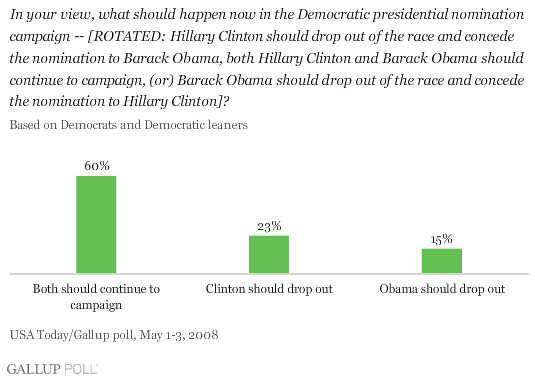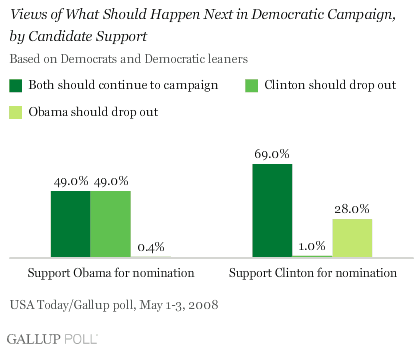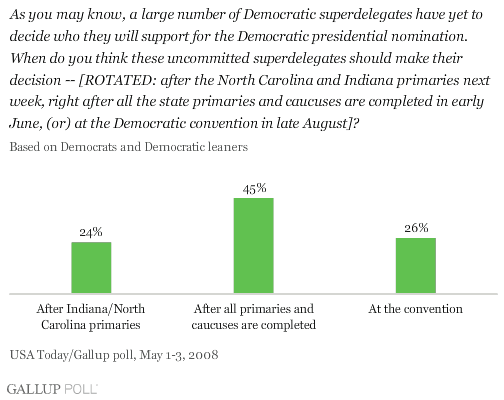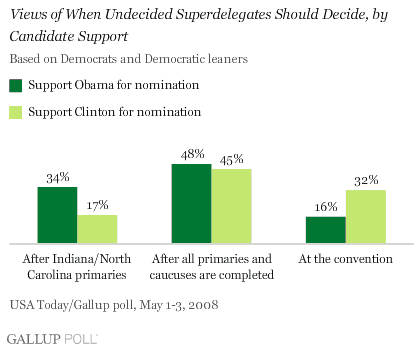PRINCETON, NJ -- Heading into Tuesday's important North Carolina and Indiana presidential primaries, 6 in 10 Democrats say Hillary Clinton and Barack Obama should continue their presidential campaigns. Of the minority who would like to see either Clinton or Obama drop out and concede the nomination, more call for Clinton to step down than Obama.

These results are based on the May 1-3 USA Today/Gallup poll.
There have been calls for Clinton to drop out, given Obama's lead in pledged delegates, which he built up in a string of primary and caucus victories in February. Those calls have been quieted to some extent with Clinton's big wins in the March 4 Ohio and Texas primaries and the April 22 Pennsylvania primary. Even so, she is unlikely to overcome the delegate deficit unless she can convince a disproportionate amount of undecided superdelegates to support her candidacy.
Democrats' opinions about the next steps in the campaign are, not surprisingly, highly influenced by the candidate they currently favor. Obama supporters are about evenly divided between favoring a continuation of the campaign, and wanting to see Clinton drop out and concede to Obama. Clinton supporters mostly favor having the campaign continue, obviously to allow Clinton a chance to catch up to Obama, while the remainder say Obama should drop out.

If the remaining contests play out as the prior contests have, with the candidates fairly evenly matched, then the decisions of the remaining uncommitted superdelegates will determine the party's presidential nominee.
The poll asked Democrats for their views on when the undecided superdelegates should decide whom to support for the nomination. Most would seem to agree with Democratic National Committee Chairman Howard Dean that all superdelegates should commit to a candidate by the end of June. This includes 24% who want superdelegates to decide immediately (after Tuesday's primaries) and an additional 45% who seem willing to allow the superdelegates until the end of the primary and caucus season to make up their minds. The last contests are scheduled for June 3. Only about one-fourth of Democrats say the superdelegates should be able to decide at the party's nominating convention in late August.

Here again, Democrats' preferences vary by their candidate of choice. Obama supporters are twice as likely as Clinton supporters to say undecided superdelegates should make up their minds this week, while Clinton supporters are twice as likely to say the superdelegates should be able to stay undecided, if they choose to do so, until the convention. Just under half of both Obama supporters and Clinton supporters say superdelegates should make up their minds after the primaries and caucuses are over.

Implications
The results suggest that a majority of Democrats are willing to allow the primary and caucus schedule to play out. That is somewhat at odds with earlier Gallup polling showing that the party rank-and-file believes the ongoing campaign is doing more harm than good to the Democrats' chances of winning the November election. The sentiment in the most recent poll may reflect an expression of support for letting all voters have their say.
Indiana and North Carolina are the two largest contests remaining, so if the results of these primaries are not decisive (which they are not likely to be unless Obama sweeps both), then it seems most likely that the primary campaign will go on for another month until the final contests in Montana and South Dakota on June 3.
Survey Methods
Results are based on telephone interviews with 516 Democrats and Democratic-leaning independents, aged 18 and older, conducted May 1-3, 2008. For results based on the total sample of national adults, one can say with 95% confidence that the maximum margin of sampling error is ±5 percentage points.
Interviews are conducted with respondents on land-line telephones (for respondents with a land-line telephone) and cellular phones (for respondents who are cell-phone only).
In addition to sampling error, question wording and practical difficulties in conducting surveys can introduce error or bias into the findings of public opinion polls.
To provide feedback or suggestions about how to improve Gallup.com, please e-mail feedback@gallup.com.
